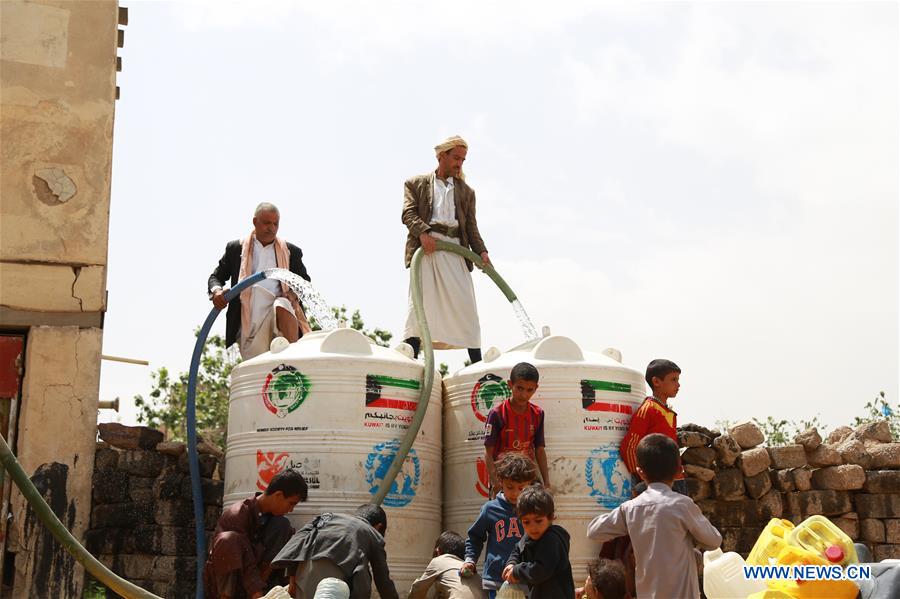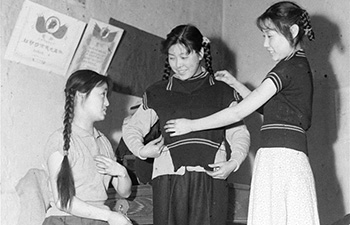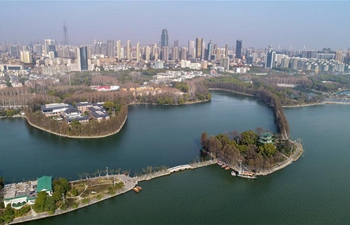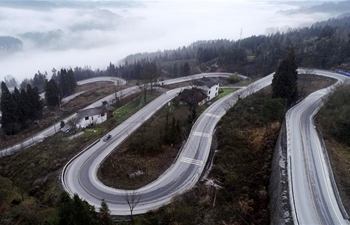 ?
?Yemeni children wait to fill their plastic containers with drinking water from a charity water tank in the ongoing water crisis in Sanaa, Yemen, on March 7, 2019. Yemen has suffered from grinding crisis of water after four years of deadly civil war. According to the UN, over 18 million Yemenis currently lack access to clean drinking water. (Xinhua/Mohamed al-Azaki)
by Mohamed al-Azaki
SANAA, March 7 (Xinhua) -- Yemen has suffered from grinding crisis of water after four years of deadly civil war. According to the UN, over 18 million Yemenis currently lack access to clean drinking water.
Charity water tanks are helpful for the residents on Wadi Ahmed outskirts in the north of the capital Sanaa, which contain clean water donated by rich Yemeni family.
"Generous and rich families now donate clean water. Some international aid agencies have provided some charity empty tanks but they did not continue to provide water," said Yahya al-Kudaymi, resident of Wadi Ahmed outskirts.
The war has destroyed all basic services, damaged water networks, electricity and sanitation system, and forced millions of children out of school. Tens of thousands of state employees have been unpaid for more than three years. Most of the capital residents relay mainly on charity's help.
When the tank trucks came, the residents rushed to racing for water. It usually takes some 15 minutes to empty the tanks. Residents should store some of their filled buckets for two to three days until other water trucks arrived.
Mohammed Salah, one of the water trucks' drivers on Wadi Ahmed outskirts, said that he had signed a contract with a local charity group for a one-month work to carry clean water to these tanks.
"Today is the last day of this contact deal, and as of tomorrow, I will not be able to provide water to these tanks. I urged charity organizations and groups to continue to help these poor neighborhoods," Salah said.
Charity works depend mainly on the availability of fuel. Sanaa, like other besieged cities in the country's north, faces fuel shortages every month because of the war and blockades.
"The cause of water crisis is the blockade which leads to fuel shortages and halt of electricity," said Abduljalil al-Kumaim, spokesperson of rebel-controlled water ministry.
The humanitarian situations have dramatically deteriorated since the war erupted in late 2014.
Prolonged fuel shortages in the local markets caused water pumps to stop and damaged large part of the agriculture sector.
The country also faces severe shortages in providing hard currency to import needy fuel as its banking system has collapsed because of the war.
The UN has asked for 4.2 billion U.S. dollars in aid to help to ease the humanitarian catastrophe in the country. Nearly the same number of more than 18 million Yemenis are on the brink of starvation.
UN Special Envoy to Yemen Martin Griffiths has been shuttling between the rebel Houthi movement in Sanaa and exiled government in Riyadh amid efforts to salvage the deal, which intended to clear the way for wider negotiations to end the devastating war.
However, there was no solution in sight to break the deadlock in Yemen's peace process. Millions of Yemenis are struggling as the conflict continues.















